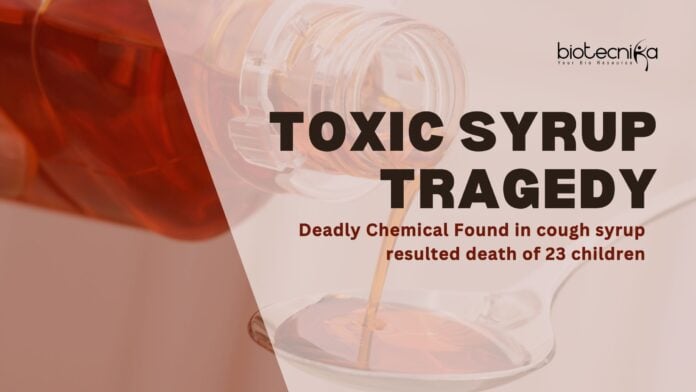Antifreeze in Medicine? Toxic Cough Syrup Kills 23 Children in Madhya Pradesh
The syrup contained 48.6% diethylene glycol, a toxic chemical used as an antifreeze, and officials have seized samples and launched a nationwide crackdown on contaminated medicine.
Chhindwara, Madhya Pradesh | A new tragedy has hit India’s pharmaceutical sector: at least 23 children, aged between one and six years, have died, in Madhya Pradesh’s Chhindwara district. This occurred after they consumed common cough syrup contaminated with diethylene glycol (DEG), a toxic industrial solvent found in antifreeze and brake fluids.
State drug regulators conducted tests that revealed that one of the syrups contained a staggering 48.6% diethylene glycol, significantly surpassing the acceptable limit of less than 0.1%. Diethylene glycol (DEG) is a toxic alcohol known to cause damage to the kidneys, liver, and nervous system, often resulting in acute kidney failure in children.
Authorities have traced the contamination to three formulations.
- RESPIFRESH, manufactured by Gujarat-based Rednex Pharmaceuticals, contains 1.3% DEG.
- RELIFE Syrup, produced by Gujarat-based Shape Pharma, had 0.6% DEG.
- COLDRIF Syrup, manufactured by Tamil Nadu-based Sesran Pharma, showed 48.6% DEG.
Children Showed Signs of Acute Kidney Injury
Doctors treating young victims have consistently reported a pattern of acute toxicity symptoms. Initially, the children experienced abdominal pain, vomiting, diarrhoea, and headache. This is followed by an inability to pass urine, an altered mental state, and the rapid onset of acute kidney injury, which is the most fatal consequence of diethylene glycol poisoning. Health officials have explained that toxic compounds damage the renal tubules, leading to complete kidney shutdown if left untreated. As one pediatric specialist clarified, “Once the kidneys fail, toxins accumulate quickly, and small children succumb within days.”
Following an incident that sparked nationwide concern, health officials in Punjab initiated a comprehensive crackdown to avert similar incidents. On Wednesdays, officials collected approximately 10 syrup samples from various areas, including Pindi Street, Dugri, Khanna, and Jagraon. On the following day, Thursday, three additional samples were collected from a manufacturing unit in Ludhiana.
Dinesh Gupta, the Zonal Licensing Authority (ZLA) for Drugs Control, stated that the samples would be dispatched to the government analytical lab in Kharar, with results anticipated within three weeks. Gupta clarified that polyethylene glycol (PEG), a common sweetener and solvent found in cough syrups, might contain trace amounts of diethylene glycol as a manufacturing impurity.
“Approximately 0.1 percent of diethylene glycol is permissible in cough syrups; anything exceeding this level is unsafe for human consumption,” Gupta stated, further explaining that contamination often results from poor-quality polyethylene glycol. He confirmed, “Should elevated levels be detected, we will initiate legal action against the manufacturers.”
The tragedy in Chhindwara once again highlighted the systemic weaknesses within India’s drug safety regulations. Despite numerous similar incidents, contaminated syrups continued to be available on the market.
In 2023, Indian-made syrups contaminated with DEG were linked to the deaths of 70 children in Gambia and 18 children in Uzbekistan. This was followed by an earlier incident between December 2019 and January 2020, when 12 children under five died in Jammu after consuming tainted cough syrup.
Experts attribute the difficulty in monitoring hundreds of small-scale, low-cost manufacturers that produce unapproved, over-the-counter syrups to the fragmented drug regulatory system.
Following recent fatalities, the Union Health Ministry advocated for the “rational use” of cough syrups for children, confiscated samples, and initiated a comprehensive investigation. Nevertheless, public health experts contend that these tragedies will persist unless all syrups intended for both export and domestic consumption are subjected to mandatory testing.
As grieving families in Madhya Pradesh demand justice, the country confronts a sobering question: How many more warnings will be necessary before India’s drug safety system undergoes genuine reform?

























